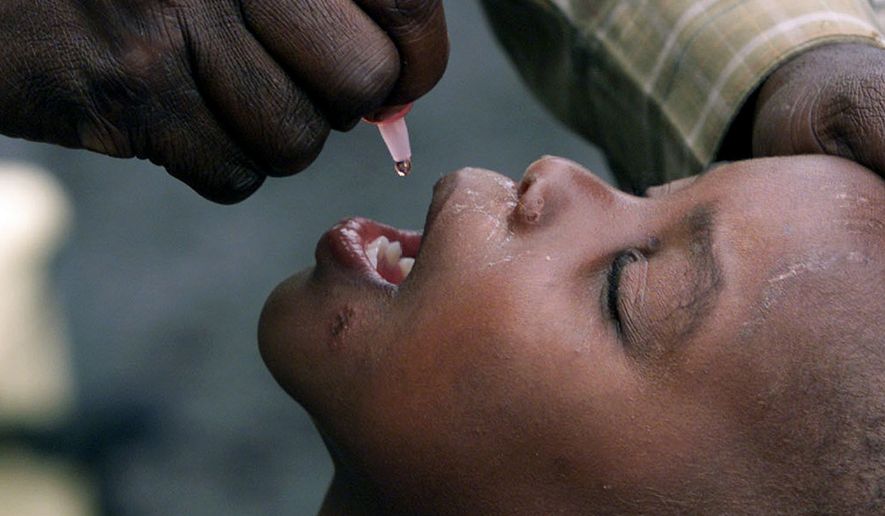Vaccination-wary groups are calling for the World Health Organization to halt the use of an oral polio vaccine following reports of 11 new cases of polio attributed to the vaccine in five countries.
“In impoverished communities with substandard sanitation and living conditions, vaccine strain poliovirus can contaminate water sources used for bathing and drinking, which can lead to more cases of vaccine strain polio paralysis,” said Barbara Fisher, co-founder and president of the National Vaccine Information Center. “Until polio eradication campaigns stop using live oral polio vaccine, the vaccine strain polio virus will continue to cripple children and adults.”
She said parents of U.S. children injured by vaccines in the mid-1990s called for an end to the government’s recommendation of giving children five doses of the oral live poliovirus vaccine because of paralysis caused by the vaccine’s strain of the disease.
In rare instances, the strains of an oral polio vaccine (OPV) that contains a live, weakened form of the virus can mutate and spread in communities that are not fully vaccinated against polio.
“The medical establishment repeatedly claims that the science regarding vaccines is settled,” said Del Bigtree, CEO and founder of Informed Consent Action Network, adding that the outbreak of vaccine-derived cases “highlights the danger of eliminating the human and civil right of informed consent with regard to vaccines — a right available for all other medical products and procedures.”
Pakistan, Nigeria, Congo, the Central African Republic and Angola reported multiple cases of polio linked to the oral vaccine. So far, 157 vaccine-derived polio cases have been reported globally this year, outpacing 107 cases of poliovirus in the wild.
Other countries in Africa and Asia have reported cases of vaccine-derived poliovirus.
All the current vaccine-derived cases are tied to a type 2 virus contained in the vaccine. Wild poliovirus type 2 was declared eradicated worldwide in 2016.
About 93% to 95% of a population needs to be vaccinated to achieve herd immunity, or protection of a whole community against the spread of a disease.
“The problem is not with the vaccine itself but with low vaccination coverage,” said Oliver Rosenbauer, a spokesman for WHO. “If OPV is administered to only a few in a large susceptible population, then the vaccine virus can continue to multiply, genetically change and spread in those not vaccinated. If a population is fully immunized, they will be protected against the change and spread of this virus.”
There is an inactivated polio vaccine that is injected and does not contain a live virus. But that vaccine provides only personal protection and does not prevent the onward spread of the virus, Mr. Rosenbauer said.
“Only OPV has that benefit, which is why we need OPV to eradicate polio from the world,” he said.
Dr. William Schaffner, professor of preventive medicine and infectious diseases at Vanderbilt University, said WHO recognizes the fatal flaw with the oral vaccine and is working to transition countries to an injectable vaccine, noting that an oral version has been successful and is cheaper and easier to administer.
“We now have this problem that we have created by the use of this oral vaccine because these mutated strains are now spreading,” Dr. Schaffner said. “They would not spread if the communities in which they occur have been comprehensively vaccinated. But if countries back off their vaccination commitments and don’t vaccinate all their kids, that’s when you have these mutated viruses spreading.”
“And a needle and syringe program is much more expensive, much more elaborate to undertake in the field,” he said. “You have all those needle and syringe safety issues, for example. You have to have much more training of people to administer the vaccine than just giving kids a drop on their tongue or on a sugar cube.”
Since 2000, the only polio vaccine that has been given in the U.S. is the inactivated vaccine, a move the National Vaccine Information Center advocated for in 1999.
The U.S. eradicated polio in 1979.
• This article is based in part on wire service reports.
• Shen Wu Tan can be reached at stan@washingtontimes.com.




Please read our comment policy before commenting.